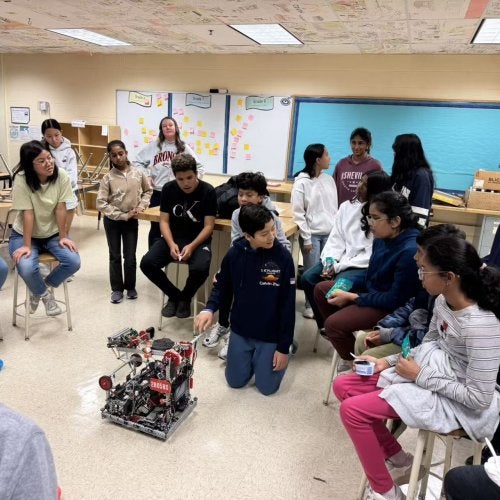COLLEGE PARK, MD (April, 2013) Three doctoral students in Developmental Science in the Department of Human Development and Quantitative Methodology at the College of Education have been selected to receive Graduate Research Fellowships from the National Science Foundation. Sonya Troller-Renfree (Advisor: Nathan Fox), Jenessa Malin (Advisor: Natasha Cabrera) and Laura Elenbaas (Advisor: Melanie Killen) were selected for the NSF fellowship.
The NSF Graduate Research Fellowship Program (GRFP) recognizes and supports outstanding graduate students in NSF-supported science, technology, engineering and mathematics disciplines who are pursuing research-based Masters and Ph.D. doctoral degrees. The COE students captured three of the thirty-six awards offered in Developmental Psychology this year nationwide.
The extremely competitive Graduate Research Fellowship Program is the oldest graduate fellowship of its kind and has a long history of selecting recipients who achieve high levels of success in their future academic and professional careers, including numerous Nobel Prize winners. NSF Fellows receive generous financial support, opportunities for international research and professional development, and the freedom to conduct their own research.
NSF Graduate Research Fellows
- Sonya Troller-Renfree (advisor: Nathan Fox) is a first year Doctoral Student in the Department of Human Development and Quantitative Methodology with a specialization in Developmental Science. Her research focuses on developing a better understanding how early adversity effects executive skills in children and whether deficits in these skills can be ameliorated through cognitive training paradigms.
Research has shown that as early as preschool, children from low socio-economic households show deficits in executive skills. Proficiency in executive skills during childhood predicts a multitude of positive outcomes during childhood and adolescence, such as better academic performance and lower incarceration rates. Studies have also shown that children who are better able to shift their attention are also better at regulating their emotions and are less likely to develop anxiety disorders. The goal of Sonya's GFRP proposal is to examine the effectiveness of attention-shift training in preschoolers and whether there are transfer effects to closely related cognitive domains such as working memory and fluid intelligence. The results of this study will provide basic information on the feasibility of employing attention-shift training as a low cost, easy to administer learning tool and as an evidence-based intervention for at-risk preschool-aged children.
- Laura Elenbaas (advisor: Melanie Killen) is a doctoral student in Human Development and Quantitative Methodology (Developmental Science specialization). Her research interests are moral judgments, intergroup attitudes, resource allocation, and social development.
Laura's NSF GRFP proposal focuses on the issue of decision-making pertaining to the fair allocation of limited resources. Resource allocation is a central aspect of morality and is inherent in social interactions from childhood to adulthood. Research has revealed that young children distribute limited resources equally amongst potential recipients, and with age they discover that needs and deservedness can make an equitable distribution more fair than strict equality. Unfortunately, resource inequalities in adult society often persist along racial lines; this raises the question of how early racial biases are reflected in research allocation decisions. When children witness social inequality that benefits one group at the expense of another, how will they choose to divide up resources? The goal of Laura's proposed research is to examine how children make decisions in such situations, in which their moral values of fairness, justice, and rights are contrasted with their identification with social groups. This research will generate new and important knowledge on how resource distribution decisions in the face of social inequalities change with age, and how group dynamics influence these decisions.
- Jenessa Malin (advisor: Natasha Cabrera) is a second-year doctoral student in the Department of Human Development and Quantitative Methodology (Developmental Science specialization). Jenessa's research interests include parenting in low-income families, in particular the factors that are linked to adaptive and maladaptive parenting and the early cognitive and social development of immigrant children.
Jenessa's NSF GRFP proposal is framed by a social-interactionist approach to language learning that children learn language from interacting with others, particularly parents, during the early childhood years. The proposed research examines the association between parental education and children's vocabulary skills in a sample of Latino immigrant mothers and fathers and their dual language learning children. Additionally, the proposed research will examine how mothers' and fathers' shared book-reading mediates the association between maternal and paternal education and children's emerging bilingual vocabulary development. Jenessa's proposed study's findings will have distinct implications for the early educational achievement of Latino children growing up in bilingual home and school environments.
-end-
For more information on the College of Education, visit: www.education.umd.edu
or contact
Halima Cherif, Director for Communications, at: hcherif@umd.edu


